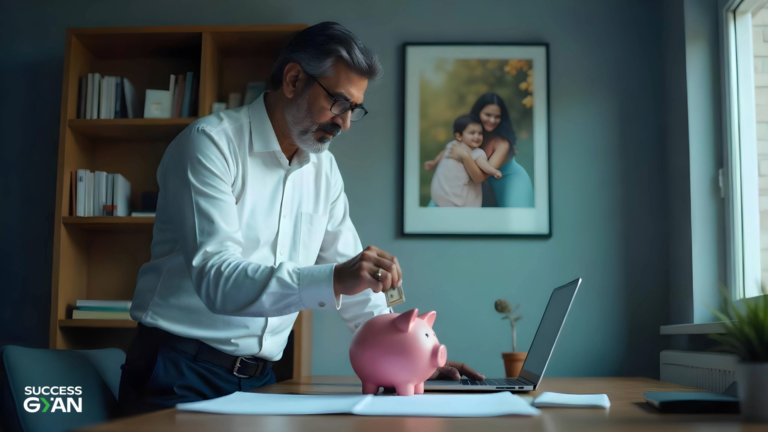

Rebuilding Your Emergency Fund After a Financial Setback
Can you overcome a financial crisis without swiping your credit card or taking out a loan?
Then pat yourself; you have planned your finances well!
But what about those who struggle during such a crisis?
It is not easy for everyone to manage a financial setback unless and until they have an emergency fund saved for them. With the unexpected expenses, lifestyle changes, high cost of living, and various other reasons, keeping some money aside for emergencies is a bit difficult. Despite such difficulties, if you have saved it, you know the struggle.
Now, the real struggle occurs when you have to spend that emergency money when there is an uninvited need. It may feel good that you didn’t seek anyone’s help or step into a bank to cover it. But you also have to remember that you have to rebuild that emergency fund from the start, which sounds tedious.
Because when you start back, there is a high chance that it may derail your financial independence plan if you have one. Wait, do you actually have one? It’s not something one can have, and the other can choose not to have. Although it is a choice for many, if you want to sleep without worrying about the near future, you need to have one.

Before jumping on how you bounce back after a financial setback, here’s why a financial independence plan is a need of the hour!
You know what a financial plan is all about?
A personal map to hit a point where you have built up enough wealth to cover your living expenses without touching your regular paycheck.
Everyone’s journey looks a bit different based on their unique situation and goals. But at its core, a solid plan often blends smart budgeting, consistent saving, strategic investing, and finding ways to generate extra income streams. It’s about making your money work for you over time so you can eventually have the freedom to choose how you spend your days.
Whether you are dreaming of early retirement, the flexibility to switch careers or just peace of mind, a Financial Independence Plan is your tool for turning those aspirations into reality. It’s not about getting rich quickly but rather about making intentional choices today that set you up for financial freedom tomorrow.
Key aspects of a Financial Independence Plan:
Budgeting
If you think budgeting is planning just your monthly expenses, you are somehow misguided.
Budgeting is crafting a thorough plan to track and control spending.
And you never forget to include a significant portion of income to allocate for savings and investments in your budgeting.
Savings Goals
You may not be earning forever to save forever. So, set clear, long-term goals considering how much money needs to be saved to cover living expenses and future needs.
This is one of the crucial steps in deriving a financial plan.
Debt Management
This is a way to get your debts under control. Simply reduce or eliminate high-interest debt to free up more income for saving and investing.
When not sure, in this case, seek a third-party counselor’s help to stand on the safer end.
Investment Strategy
Put your hard-earned money in something that amplifies. For example, stocks, bonds, real estate, or businesses that bring in passive income and grow wealth over time.
Multiple Income Streams
If your income suffices your regular needs and expenses, find additional sources to earn more money as a passive income(e.g., rental income, dividends, or side businesses).
Keeping that money from passive income exclusively to save money helps reduce reliance on earned income.
Regular Review
From time to time, check your progress and adjust the plan based on life changes, market conditions, or new financial goals.
With this financial planning that provides financial security, you can retire early or pursue personal passions without financial worries. And that’s the perfect life anyone would aspire to have, isn’t it?
Now, do you want anything to hamper such a well-planned, dreamy life? No, right? If so, you need to have an emergency fund to safeguard your plan for financial independence.
To picture why it is necessary, find the reasons and scenarios that let you know how it makes things better in life!

Now let’s understand why an emergency fund is crucial:
To emphasize the importance of the emergency fund, we have given a few benefits you reap from having one. Check why you can’t skip building an emergency fund.
Security: Life doesn’t inform you what it is coming up with, whether it is an unexpected medical bill, your car breaking down, or losing your job. Having money set aside means you won’t have to scramble or panic when these things happen.
Wards off Stress: There’s something incredibly comforting about knowing you have a financial buffer ready in your personal finances. It lets you sleep better at night and focus on actually living your life instead of constantly worrying about “what ifs.”
No More Debt: Without an emergency fund, you might find yourself reaching your credit cards when in trouble. And nobody wants to be stuck with high-interest debt that seems to take forever to pay off.
Maintain Financial Goals: Having an emergency fund means you won’t have to raid your other savings. The money you set aside for retirement or maybe a down payment on a house. It can stay right where it belongs, growing toward your future goals.
Flexibility: The best part is that the emergency fund gives you options. Maybe you are feeling stuck in a job you don’t love, or you have got a brilliant business idea. With decent money secured, you can actually consider making moves without feeling trapped by money worries.
Therefore, with financial security comes peace of mind. Whether life throws you lemons or opportunities, nothing can shake you with the mindset of “So, what? I can manage it”.
Here’s how you can rebuild the emergency fund
Dipping into your emergency fund can feel like a setback on your journey to financial independence. But that’s what it’s there for.
Now let’s talk about how to build it back up without compromising your bigger financial goals:
First Things First: Get a Clarity
Before jumping in, breathe out and see where you stand. Check your current expenses, income, and any debt you might have picked up along the way. In short, get a clear picture of your starting point.
Start Small, But Start Now
You know how people say “Rome wasn’t built in a day”? Well, neither is an emergency fund. Set up an automatic transfer, even if it’s just 100 Rs a week. It might not feel like much, but it adds up faster than you think. The key is making it a habit so you are not tempted to skip it.
Become a minimalist
Look, no one’s suggesting you live starving. But there are probably some tweaks you can make to your budget. Moreover, trust us, minimalism gives a different level of satisfaction.
– Maybe switch that gym membership for some home workouts (YouTube has tons of free content)
– Consider a “staycation” instead of that big trip this year
– Take a look at those subscriptions – do you really watch all those streaming services?
Make the Most of Extra Cash
Got a tax refund coming? A bonus at work? Before you treat yourself, consider throwing at least a portion of it into your emergency fund. And if you have some spare time, maybe pick up a side gig, even temporary work can help speed things up.
Keep One Foot in the Investment
Here is a mistake most people make: completely stopping their investments to rebuild their emergency fund. Instead, try this: split your extra money between both. Maybe it’s 70/30 in favor of your emergency fund at first, but don’t completely abandon your long-term goals
Dealing with Debt
This is one of the major factors in money management, so be wise. If you had to take on some debt during your emergency, tackle the high-interest stuff first. Credit card debt can be a real momentum killer when trying to save.
Set a Realistic Target
After going through an emergency, you might want to add up your funds even more than before. If three months of expenses felt tight, maybe aim for six. It’s all about what helps you sleep better at night.
Remember, you are not starting over; you are just making a pit stop on your journey toward financial independence. Keep your eyes on the endpoint, stay flexible, and give yourself credit for taking action.
Conclusion
The smartest way to handle the financial surprises without getting into trouble is to build a solid emergency fund. As you know, money troubles don’t come alone; they tend to show up alongside other major setbacks, like when a loved one falls ill, you are in an accident, or you suddenly lose your job.
Having that emergency fund secured for you can make these major setbacks feel more manageable, giving you the peace of mind and confidence to tackle whatever comes your way. It’s okay if you don’t have one yet. The best time to start is today, so start building yours!
FQAs on Rebuilding Your Emergency Fund After a Financial Setback
Unexpected job loss is a classic financial setback that many people face. Imagine getting that dreaded meeting invite from HR – suddenly, you are pushed to adjust without your regular paycheck. Other common setbacks include major car repairs or unexpected medical bills.
Don’t spend more than you earn. Living below your means gives you breathing room for savings and helps you avoid the stress of mounting debt. Sure, it might be tempting to splurge on the latest iPhone or designer bag, but financial peace of mind feels way better than temporary retail therapy.
Emergency funds have your back in many cases. Car broke down? No need to panic. It’s basically your “sleep better at night” money that keeps you from having to swipe your credit card debt or beg family members for help when things go sideways. Most experts suggest having enough to cover 3-6 months of essential expenses.
Unexpected job loss is a classic financial setback that many people face. Imagine getting that dreaded meeting invite from HR – suddenly, you are pushed to adjust without your regular paycheck. Other common setbacks include major car repairs or unexpected medical bills.
Don’t spend more than you earn. Living below your means gives you breathing room for savings and helps you avoid the stress of mounting debt. Sure, it might be tempting to splurge on the latest iPhone or designer bag, but financial peace of mind feels way better than temporary retail therapy.
Emergency funds have your back in many cases. Car broke down? No need to panic. It’s basically your “sleep better at night” money that keeps you from having to swipe your credit card debt or beg family members for help when things go sideways. Most experts suggest having enough to cover 3-6 months of essential expenses.

Millionaire Mind Intensive is about unlocking your financial freedom and strengthening your relationship with money.
Quick Links
Contact Info
Success Gyan India LLP
S5, Thiru Vi Ka Industrial Estate,
Guindy, Chennai – 600032







